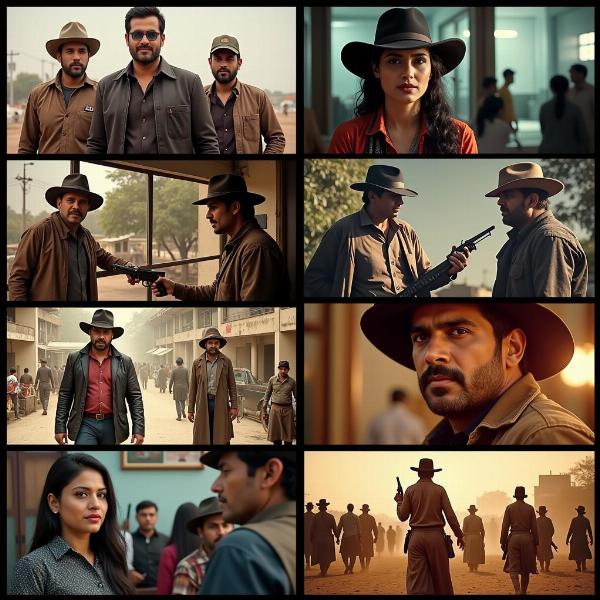Outlaw meaning in Hindi encompasses various terms reflecting the concept of someone living outside the law. Understanding the nuances of these translations provides a deeper insight into Indian culture and legal history. This article will explore the various Hindi words used for “outlaw,” their cultural significance, and common usage.
Different Hindi Words for “Outlaw”
Several Hindi words convey the meaning of “outlaw,” each with its own connotations and historical context. Some of the most common include:
- Baaghi (बागी): Often translated as “rebel” or “mutineer,” baaghi implies someone who actively defies authority, often with political or social motivations. This term carries a sense of resistance and defiance against an oppressive system.
- Vidrohi (विद्रोही): Similar to baaghi, vidrohi also signifies a rebel, but it carries a stronger connotation of armed resistance and revolt. It can be used to describe individuals or groups engaged in armed struggle against the state.
- Daaku (डाकू): This term refers to a robber or bandit, particularly those operating in gangs. Daaku evokes images of highwaymen and thieves, often romanticized in folklore and popular culture. The Chambal region, historically known for banditry, often features in stories about daakus.
- Apradhi (अपराधी): A general term for “criminal” or “offender,” apradhi encompasses anyone who breaks the law, regardless of the specific crime. While it can include outlaws, it doesn’t specifically refer to someone living outside the law.
- Kanun Todne Wala (कानून तोड़ने वाला): This phrase literally translates to “law-breaker.” It’s a more descriptive and less loaded term than daaku or baaghi.
Cultural Significance of “Outlaw” in India
The concept of the outlaw has a complex and fascinating history in Indian culture. From ancient tales of righteous bandits to modern-day portrayals of social rebels, outlaws often represent resistance against injustice and oppression.
In some cases, outlaws are romanticized as Robin Hood-like figures who fight for the poor and oppressed against corrupt officials or social inequalities. This romanticized view often stems from the harsh realities of class division and social injustice prevalent in some parts of India. Stories of daakus redistributing wealth stolen from the rich to the poor resonate with those who feel marginalized and disenfranchised. However, it’s crucial to remember that these are romanticized narratives, and the reality of outlawry often involves violence and criminal activity.
Outlaw Meaning in Hindi: Legal Perspective
From a legal standpoint, an outlaw is simply someone who has broken the law and is fleeing from justice. The Indian legal system, influenced by British common law, does not recognize the romanticized notion of the outlaw. Anyone who commits a crime is subject to prosecution and punishment.
Outlaw Meaning in Hindi: Modern Usage
Today, the term “outlaw” and its Hindi equivalents are still used in various contexts. In news reports and legal discussions, apradhi and kanun todne wala are common terms. In literature, film, and popular culture, baaghi, vidrohi, and daaku continue to be used to depict characters who defy authority, often for noble causes.  Modern Outlaw in Indian Media However, the romanticized image of the outlaw is often challenged by more realistic portrayals that acknowledge the complexities of their actions.
Modern Outlaw in Indian Media However, the romanticized image of the outlaw is often challenged by more realistic portrayals that acknowledge the complexities of their actions.
Outlaw Meaning in Hindi: FAQs
- What is the most common Hindi word for outlaw? While apradhi and kanun todne wala are commonly used, daaku, baaghi, and vidrohi are frequently used in specific contexts related to banditry and rebellion.
- Are outlaws always seen negatively in India? Not always. Historically, some outlaws have been romanticized as figures of resistance against injustice.
- Is there a legal definition of “outlaw” in India? The Indian legal system focuses on specific crimes rather than the broad term “outlaw.”
- How is “outlaw” used in modern Indian media? The term and its Hindi equivalents are used in news, literature, and film, often portraying complex characters who defy authority.
- What is the difference between baaghi and vidrohi? While both mean “rebel,” vidrohi suggests a stronger sense of armed resistance.
Conclusion
Understanding the various Hindi words for “outlaw” and their cultural significance provides a richer understanding of Indian history, society, and legal perspectives. From the romanticized daaku to the rebellious baaghi, these terms reflect the complex relationship between law, authority, and resistance in India. If you’re interested in learning more about Hindi translations and Indian culture, explore our other articles on Meaning-Hindi.in.
class division meaning in hindi
Meaning-Hindi.in is your premier resource for professional Hindi translation services. We offer a comprehensive range of services, from business and legal document translation to website localization and technical manual translation. Our expert team ensures accurate, culturally sensitive translations for all your needs. Contact us at [email protected] or call +91 11-4502-7584 to discuss your translation requirements. Meaning-Hindi.in – bridging the language gap, connecting cultures.